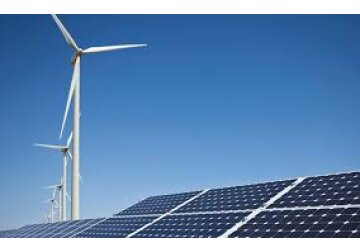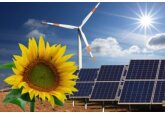
The International Energy Agency is launching a roadmap for Moldova to integrate renewable energy systems.
The Ministry of Infrastructure and Regional Development reported this, noting that increasing the share of renewable energy sources in Moldova's energy balance is important for achieving the goals of the National Energy Strategy until 2030 to ensure the security and sustainability of the country's energy supply, while strengthening regional and European integration. It is emphasized that Moldova's power system is dependent on imports, which in 2020 provided 69% of the demand. Meanwhile, renewable electricity accounted for just over 12% of domestic production. The development of wind and solar energy in Moldova remains modest: the potential capacity of electricity production from renewable sources such as wind, solar, biomass and hydropower is over 27 GW. At present, the following renewable energy capacities are being developed in Moldova: wind - 73.4 MW; solar - 24.5 MW; hydro - 16.25 MW; biogas - 6.35 MW. In order to provide decision makers at all levels in Moldova with a vision of a clean, safe and modern electricity system, the International Energy Agency has launched a roadmap to integrate renewable energy systems for our country. The roadmap was presented jointly with the Ministry of Infrastructure and Regional Development, with the support of the European Bank for Reconstruction and Development, Hitachi and WindEurope and developed as part of the IEA's work under the EU4Energy program. The document examines the real steps the Moldovan government can take to improve the energy system and promote investment in renewable energy sources, removing bureaucratic barriers to implementation and creating a flexible electricity market with enhanced regional coordination. It is emphasized that the development of electricity production from renewable sources would not only help our country to implement the National Energy Strategy and increase the country's energy security, but would also bring significant socio-economic and environmental benefits. By encouraging investments in renewable sources, Moldova could reduce its dependence on imported natural gas, maximizing domestic energy consumption. Other benefits include reducing health problems caused by air pollution and creating green jobs, especially in rural areas. Constantin Borosan, state secretary of the Ministry of Infrastructure and Regional Development, noted that renewable energy will play a very important role for Moldova, contributing to increasing its own energy production, ensuring sustainable development and mitigating climate change. According to him, today more than ever, Moldova's energy sector demonstrates how vulnerable and dependent on energy imports it is. In this regard, the government is working hard to develop necessary actions to attract investors in the development of new projects and energy production facilities, as well as is paying special attention to the integration of national electricity and natural gas markets into the common energy market of the European Union. The share of energy from renewable sources in the total final consumption of energy in Moldova in 2020 made up 25.06%, thus, Moldova reached the the Energy Community-set goal of 17%. Moreover, to promote renewable sources, in December 2021, the Government approved new capacity quotas until 2025, allocating 400 MW, of which 250 MW to intermittent sources and 150 MW to continuous sources. // 16.03.2022 - InfoMarket







